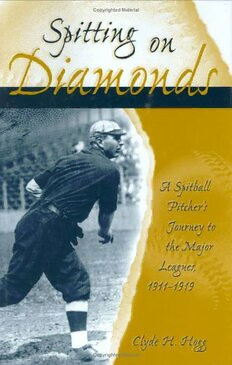
Spitting On Diamonds: A Spitball Pitcher's Journey To The Major Leagues, 1911-1919 (Sports and American Culture) PDF
342 Pages·2005·1.382 MB·English
Most books are stored in the elastic cloud where traffic is expensive. For this reason, we have a limit on daily download.
Preview Spitting On Diamonds: A Spitball Pitcher's Journey To The Major Leagues, 1911-1919 (Sports and American Culture)
Description:
Spitball \?spit-?bol\ n., an illegal pitch in which a foreign substance (spit or Vaseline) is applied to the ball by the pitcher before he throws it. Dead ball era \?ded\ \?bol\n., a time period during baseball, usually regarded as 1900–1919, when the game used a "dead" or almost soft ball during play. Usually, the same ball was used for the entire game. In 1911, when Bradley Hogg began his major-league pitching career for the National League’s Boston Rustlers, baseball was a different game. Hogg played during a time known as the dead ball era, when a pitcher could spit on, shine up, or even roughen a ball to secure an advantage over a hitter. Although only seven World Series had been played at that point, the names of the best and most colorful players remain familiar today: Cy Young, Casey Stengel, Honus Wagner, Rogers Hornsby, and Christy Mathewson. During his major and minor league career, Hogg played with or against twenty-seven Hall of Fame ballplayers and under the critical gaze of two Hall of Fame umpires and eleven Hall of Fame sportswriters. In Spitting on Diamonds, Clyde Hogg details the life of baseball’s everyman, including excerpts from newspapers throughout the country to bring to life the times in which Bradley Hogg played. The author shows how Hogg’s career is representative of the thousands of men who have played professional baseball since its inception more than 125 years ago, men who didn’t make it into the Hall of Fame or win awards but made it possible for millions of fans to enjoy the game. These players were the flannelled hosts of America’s favorite pastime and the ones who made the game what it was and is today. The author uses Hogg’s career as a spitball pitcher in leagues from coast to coast to show the rapid change and growth of our nation between 1910 and 1920. With enough baseball statistics to satisfy even the most hard-core fan, this time capsule of early-twentieth-century America will appeal to sports enthusiasts and readers of general historical nonfiction alike. They will find in its pages an America now visible only in faded photographs, along with a version of the national pastime that no longer exists. Featuring multiple bunts, double steals, inside pitching, and the now outlawed “spitball,” as well as the skill it took to hit such deliveries, this game was hard, fast, and nonstop. Spitting on Diamonds lets the reader understand what it was like to live and play professional sports when America and its national pastime were coming of age.
See more
The list of books you might like
Most books are stored in the elastic cloud where traffic is expensive. For this reason, we have a limit on daily download.
